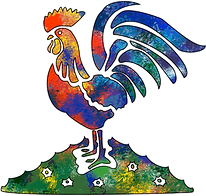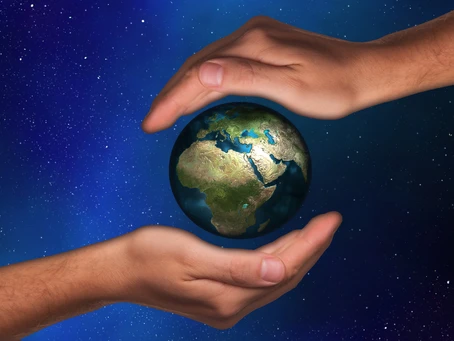Covid19, a product of our food economy?
This has been an unusual Ramadan. We’ve all been subjected to sweeping changes in our daily life and have become more aware of how viral infections can spread and what steps one can take to reduce infection. However as we now move beyond reacting to an emergency, it’s important that we address the underlying causes. Zoonotic viruses are those that can cross the species barrier and move from an animal host to humans. While this can happen ‘naturally’ it’s rare for a number of reasons, amongst which are that healthy animals in the wild, will harbour numerous viruses but exhibit no ill effects. It’s only when immune stressed (such as when in captivity or factory farming) that symptoms develop and the animal becomes more contagious. Indications are that this was the route taken by Covid19, with its suspected source from bats,,. It didn’t appear ‘naturally’ but rather was a direct result of cruel and unnatural practices in the burgeoning trade in farmed wild animals in China. Removed from their natural habitat and reared in intensive caged units, it’s no surprise that bats, a natural host for Coronaviruses, became immune-stressed and developed symptoms. It should also be no surprise that keeping different species of immune deficient animals in large numbers and at close quarters, would provide optimal conditions for the emergence of zoonotic viruses with pandemic potential. The final destination for crate upon crate of stressed and weakened animals, to a live meat market in the centre of a densely populated city, enabled the virus to jump to humans. This gross neglect, cruelty and stupidity, simply beggars belief, particularly as this is precisely what had already happened with the 2003 ,,SARS epidemic
Factory farming. A ticking time-bomb
Wild animal farming is only one small part of the global factory farming system, which now produces the overwhelming majority of our meat, dairy and eggs. Factory farming of both wild and our more familiar domesticated animals (chicken, sheep, cows etc.) is morally reprehensible for many reasons, most obviously for the inadequate animal welfare and the wider environmental impacts of feed production (through deforestation and chemical pollution) but also for the stark ,,economic and social inequalities it creates. For any decent human being, these reasons alone should be enough for us to take a stand against a global economic system, that exploits plants, animals and people alike. But even ignoring this and simply focusing on self interest, we urgently need to recognise that it also creates conditions conducive to the emergence and spread of virulent pathogens with the ability to jump from species to species and which can result in large numbers of deaths worldwide. This isn’t new. It was a strain of avian influenza which caused the 1918 Spanish Flu pandemic that killed over 50 million humans. In 1957 the number of deaths from the H2N2 Avian Flu virus was 1.1 million worldwide. In 1968, as a result of the H3N2 Swine flu virus there were over 1 million deaths worldwide. And more recently an estimated total of 575,400 died worldwide in 2009 from the H1N1 Swine Flu virus. In all these cases these have been zoonotic viruses that made the jump from animals (particularly swine and poultry) to humans. Furthermore this jump was facilitated as a direct result of our own actions, especially in regards to the treatment and welfare of farmed animals.
Self interest or responsible stewards
There is certainly no lack of ,,evidence highlighting the increased risk of pandemics due to the intensive factory farming of animals. It also doesn’t require great intelligence to recognise that confining billions of animals to industrial scale factory farming conditions, will facilitate the spread of viruses and disease. In a recent editorial commenting on the risks of Factory Farming, the American Journal of Public Health noted that, “it’s time for humans to remove their heads from the sand and recognize the risk to themselves that can arise from their maltreatment of other species.” But ultimately this is more than a question of self interest. It’s a deeply moral and spiritual question. The dilemma is in fact not a new one and represents an age old struggle between greed and moderation. In a short 10th Century treatise on the rights of animals in Islam, the Ikhwan AsSafa, commented on humankind’s responsibilities towards nature. In the ,‘Trial of the Animals’ humankind is taken to court for its abuse of nature and the judge rules in the animals favour saying they have been “sorely tested”. In his summation he states that humans need to change their ways. For if they do not “the animals will begin to disappear, one by one, forever, from the face of the earth; and the air in your settlements and fortresses will become dangerous to breathe…the seasons will be reversed and your climates turned on end…the animals you eat will bring sickness and death upon you…”
The Quran states the same truth more directly, “Pollution/corruption has appeared throughout the land and seas as a result of the deeds of humankind, so that He may let them taste some of the consequences of their own actions and in order that they might return (to the right path).” 30:41
This Ramadan we have been sorely tested. There has been a lot of talk about a ‘new normal’ and how in some way this period has been a ‘defining moment’. If so, we now have a chance to act on the lessons we have learned and make our claims of change more than empty promises. Individually and collectively we need to disentangle ourselves from a global system that is built on social injustices and engages in the systematic destruction of our natural environment. We need to recognise the sacred nature of the created world (Gods Ayaat or signs) and take seriously our responsibilities of stewardship. We need to make an assessment of how ‘halal’ and ‘balanced’ our lives truly are.
The take-away
Whatever we have gained from this period of struggle and self reflection, I hope we can all agree to make changes, small or large, to break off the chains of passive consumerism and take back some responsibility for how we interact with our environment.
-
- To source our meat and vegetables locally, from small farms where animals are treated well and plants grown sustainably.
-
- To use our cars less and continue the reduction in air pollution that lock-down inadvertently began.
-
- To nurture our connection with the earth, growing our own food: whether in an allotment, or in the garden, or simply herbs in plant pots on the windowsill.
-
- To engage collectively in taking responsibility for our local environment and communities.

